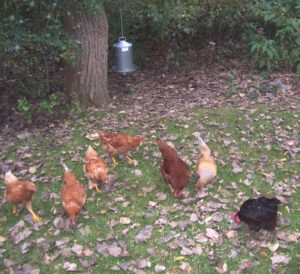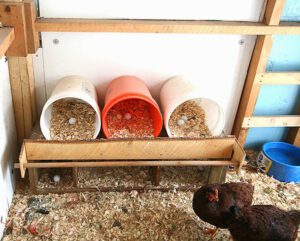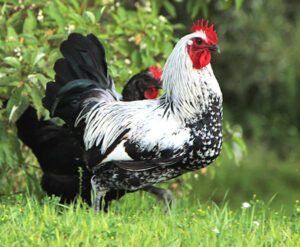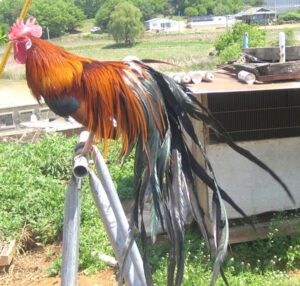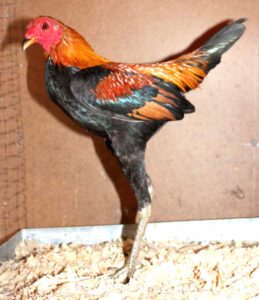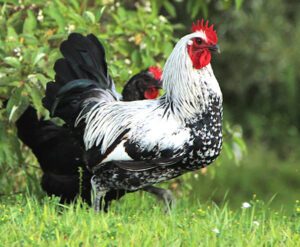Marsh Daisy chicken farming is less popular. Because it is a rare breed of domestic chicken originating in Lancashire, England. It is a dual purpose breed which is raised and valued for both meat and eggs production purpose.
Old English Game roosters were crossed with Malay hens for creating the foundation for this breed at the beginning of 1880s in Southport, Lancashire. The Sicilian Buttercups, Black Hamburgs and White Leghorns were also added to cement it’s characteristics.
The name of the breed may be related to it’s origin in a marsh-like area. Or may be from it’s large rose comb which resembles the flower of Marsh Daisy.
The breed is not too popular outside United Kingdom. And the breed has never been recognized for showing by any organizations. And today the Marsh Daisy chicken is an extremely rare breed, even in it’s homeland. And the Rare Breeds Survival Trust of the United Kingdom has listed this breed as endangered.
However, starting commercial Marsh Daisy chicken farming can help this breed to increase it’s population. And at the same time you can make good profits, because it is a good dual-purpose breed.
How to Start Marsh Daisy Chicken Farming
Starting Marsh Daisy chicken farming business is just like starting a chicken farming business with any other domestic chicken breeds. It’s a relatively strong and hardy breed and generally require less caring and other management. So starting Marsh Daisy chicken farming business is relatively easy.
You can start this business even if you are a beginner. Here we are trying to describe more information about starting and operating a successful Marsh Daisy chicken farming business from purchasing birds to caring and marketing.
Purchase Chickens
First of all, you have to purchase very good quality, healthy and disease free birds for starting and operating a successful Marsh Daisy chicken farming business. Good birds are the key for successful business.
You can start with either mature birds or day old chicks depending on the price and availability in your area. We recommend starting with day old chicks. Because the mature birds are very expensive and the day old chicks are cheaper.

You can purchase the chicks from any of your nearest chicken breeding centers, poultry chick suppliers or any existing farms. You can also search your local online classified websites.
Housing
Making a good, comfortable and secure housing system is a must for starting Marsh Daisy chicken farming business. Because a good house not only helps the birds to stay healthy but also helps them to stay free from all types of predators and adverse weather conditions.
So try to make a good and secure house for your birds. The type of the house can be any depending on your budget. It can be of full concrete setup or you can build the house with low cost and easily available materials such as bamboo and wood.
Install good ventilation system inside the house. Because good ventilation system helps to reduce gas from inside the house, and keeps your birds healthy.
Also ensure flow of sufficient amount of clean and fresh air inside the house. And make the house in such a way so that you can easily clean the house.
The Marsh Daisy chickens are classed as a heavy breed. And a mature bird will require around or up to 5 square feet of housing space.
Feeding
Feeding the birds with very good quality, healthy and nutritious food is the most important part of Marsh Daisy chicken farming business. Because good food not only helps the birds to grow better but also helps them to stay healthy and produce more.
So always try to provide your birds with enough good and nutritious food. You can feed them either with commercial poultry feeds or you can prepare the feeds of your own. Just ensure that the food is healthy and nutritious for your birds.
Never feed your chickens with contaminated food. And always try to provide them with enough clean and fresh water as per their demand.
The Marsh Daisy chickens are good for raising in both confined and free range system. But raising them in free range system will help you to reduce feeding costs. And at the same time it will help you to produce better quality products.
Breeding
The Marsh Daisy chickens are naturally very good breeders, just like many other domestic chicken breeds. They will breed easily and produce fertile eggs for hatching if you keep good ratio of hens and roosters in your flock.
Generally one healthy rooster is enough for breeding around or up to 10 hens.
Caring
The Marsh Daisy chickens are very strong, hardy and active birds. And they generally require less caring and other management. Although taking additional care will help the birds to grow better and produce more.
Inspect your birds on a regular basis for any signs of diseases or illness. And take necessary steps if you notice anything uncommon. Vaccinate your birds timely and always try to keep good contact with a vet in your area.
Marketing
Marketing chicken products is not a problem. Because chicken products have very good demand and value in the market throughout the world.
So you will probably be able to easily sell your products in the local market. Although you should set your marketing strategies before starting Marsh Daisy chicken farming business.
These are the common steps and ways for starting and operating a successful Marsh Daisy chicken farming business. It’s really very easy to raise these birds. Hope this guide has helped you! Good luck & may God bless you!

